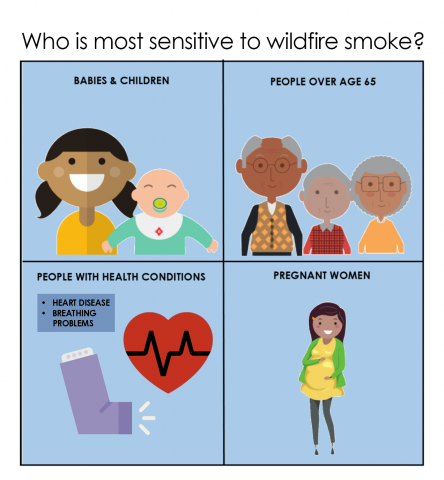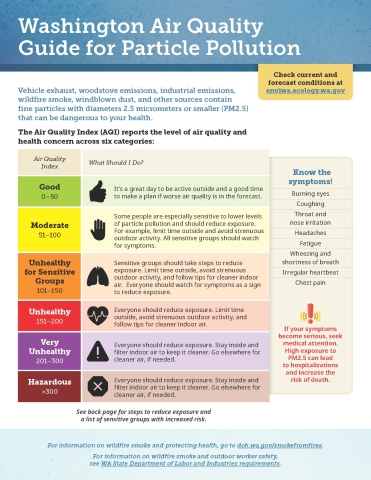Breathing smoke from wildfires isn’t healthy for anyone, but some people are more likely to have health problems when the air quality isn’t good. The best way to protect your health when air is smoky is to limit time outdoors and reduce physical activity.
People at risk for problems from smoky air include:
- Children. Their lungs and airways are still developing. They also breathe more air per pound of body weight than adults.
- Adults older than 65. They're more likely to have unrecognized heart or lung diseases.
- People with heart and lung diseases, such as asthma, COPD and heart failure, and diabetes.
- People with respiratory infections and colds.
- People who have had a stroke or heart attack.
- Pregnant people. Both the pregnant person and fetus are at increased risk of health effects.
- People who smoke. They are more likely to already have lower lung function and lung diseases.
- People with low socioeconomic status. They are more likely to have higher exposures and less likely to have access to health care.
When air is smoky, even healthy people can have symptoms or health problems. Symptoms can range from minor irritation to life-threatening complications, including:
- Sore throat
- Headaches
- Burning eyes
- Coughing
- Wheezing
- Shortness of breath
- Chest pain
People with heart or lung diseases should follow medical management plans created with their health care providers. Those experiencing serious symptoms when air is smoky, such as shortness of breath or chest pain, should seek immediate medical care. Those also experiencing fever, cough, or shortness of breath, should act as though they may have COVID-19. Protect others by staying home. Those concerned about their health can call their health care provider to discuss COVID-19 testing and other possible reasons for illness.
Early evidence indicates wildfire smoke exposures can make people more susceptible to respiratory infections, likely including COVID-19. Recent studies indicate that poor air quality can make symptoms and outcomes in people with COVID-19 more severe. And persons with, or recovering from, COVID-19 may be more at risk for negative health effects from wildfire smoke exposure because of compromised lung and heart function.
Prepare before air is smoky
Here are things you can do now to prepare for smoky days with unhealthy air quality:
- If you or a family member has heart or lung diseases (including asthma), talk to your doctor about precautions to take when air quality is unhealthy. Make sure you have necessary medications, and ask your doctor how to manage symptoms and when to seek medical care.
- Ensure you have supplies you may need if outdoor air gets smoky, such as replacement filters for your home’s central air unit, a box fan and filter with a MERV 13 rating to create a box fan filter, or a portable air cleaner with a HEPA filter.
- Make sure your vehicle has HEPA-equivalent air filter.
- Know how to turn the air conditioner in your home and vehicle to recirculate to avoid bringing smoky outdoor air inside.
- Create a plan for alternatives to outdoor family activities. You may need to exercise indoors or find alternatives to outdoor summer camps or weekend camping trips if air quality is unhealthy.
- If you must be outside during smoky air, consider purchasing a respiratory mask labeled N95 or N100 and learn how to properly wear it.
Take steps to protect your health when air is smoky
Before heading outside or traveling elsewhere in the region, check current conditions. Here are some resources for monitoring air quality:
- Washington State Department of Ecology Air Quality Monitoring website. The map uses color-coded categories to report when air quality is good, moderate or unhealthy.
- Washington Smoke Information Blog.
- Southwest Clean Air Agency. Current air quality information for Clark, Cowlitz and Lewis counties and may issue advisories when poor air quality is expected.
- Oregon Department of Environmental Quality Air quality monitoring map.
- Washington Department of Ecology AirQualityWA cellphone app.
Here are some things you can do to protect yourself and your family from wildfire smoke:
- Limit time outdoors and avoid vigorous physical activity. The Washington Children and Youth Activities Guide for Air Quality has specific recommendations for outdoor activities based on duration of the activity and air quality levels.
- Keep windows and doors closed.
- Turn the air conditioner in your home and vehicle to recirculate to avoid bringing smoky outdoor air inside.
- Don’t pollute your indoor air. Avoid burning candles, using aerosol products, frying food and smoking.
- Do not vacuum unless using a vacuum with a HEPA filter. Vacuuming stirs up dust and smoke particles.
- Use a portable air cleaner with a HEPA filter.
- Make your own clean air fan using a standard box fan and filter with a MERV 13 rating. Check out this video by Washington Department of Ecology for instructions.
- Go to public places with monitored air quality if you cannot improve poor indoor air quality at home.
- Choose alternatives to outdoor family activities, such as trips to the library or a community center.
- Relocate if the air quality is hazardous.
Public Health follows Washington Department of Health guidance when making recommendations to cancel outdoor events or activities or close schools or children's activities due to wildfire smoke impacts.
Employers should refer to guidance from Washington Department of Labor & Industries for keeping their employees safe when air is unhealthy due to wildfire smoke.
Public Health does not have jurisdiction to enforce business closures due to air quality or regulate the availability of air purifiers, filters, respiratory masks or other items.
Respirator masks
People who must be outside for extended periods of time in smoky air may benefit from wearing a special mask called a particulate respirator. Respiratory masks labeled N95 or N100 can provide some protection against wildfire smoke when properly fitted. Most people will find it difficult to correctly use respirator masks. If the mask does not fit properly, it will provide little or no protection and may offer a false sense of security.
These masks should not be used on children or people with facial hair. The masks have not been fully tested for use among children and are unable to get the necessary tight seal on people with facial hair.
People with lung disease, heart disease or who are chronically ill should consult a health care provider before using a mask. Wearing a mask makes it more difficult to breathe, which may worsen existing medical conditions.
Cloth masks
Cloth masks that are used to slow the spread of COVID-19 by blocking respiratory droplets offer little protection against wildfire smoke. They might not catch small, harmful particles in smoke that can harm your health.
N95 and KN95 respirators can provide protection from wildfire smoke and from getting and spreading COVID-19. KN95 respirators are commonly made in China and are similar to N95 masks commonly used in the United States.
Additional information
Air quality monitoring, fire locations
- Washington State Department of Ecology Air Quality Monitoring website
- Southwest Clean Air Agency
- Oregon Department of Environmental Quality Air quality monitoring map
- Washington Smoke Blog
- AirNow smoke and fire map
- Northwest Interagency Coordination Center northwest fire locations
Recommendations and resources
- Washington State Department of Health, Smoke from fires (Spanish, Russian, Ukrainian)
- Washington State Department of Health, improving ventilation and indoor air quality during wildfire smoke events (buildings with mechanical ventilation)
- Washington State Department of Health, Washington Air Quality Guide for Particle Pollution (Spanish, Russian, Ukrainian)
- Washington State Department of Health, Children and Youth Activities Guide for Air Quality
- Washington State Department of Health, Portable Air Cleaners
- Washington State Department of Health, Recommendations for wildfire smoke and respiratory illnesses
- Clark County Public Health, Wildfire smoke resources for schools
- Washington Department of Labor & Industries, Wildfire smoke and Washington workers
- Environmental Protection Agency, Guide to air cleaners in the home
- Environmental Protection Agency, Protect Your Large Animals and Livestock from Wildfire Smoke
- Centers for Disease Control and Prevention, Wildfires and Your Safety

